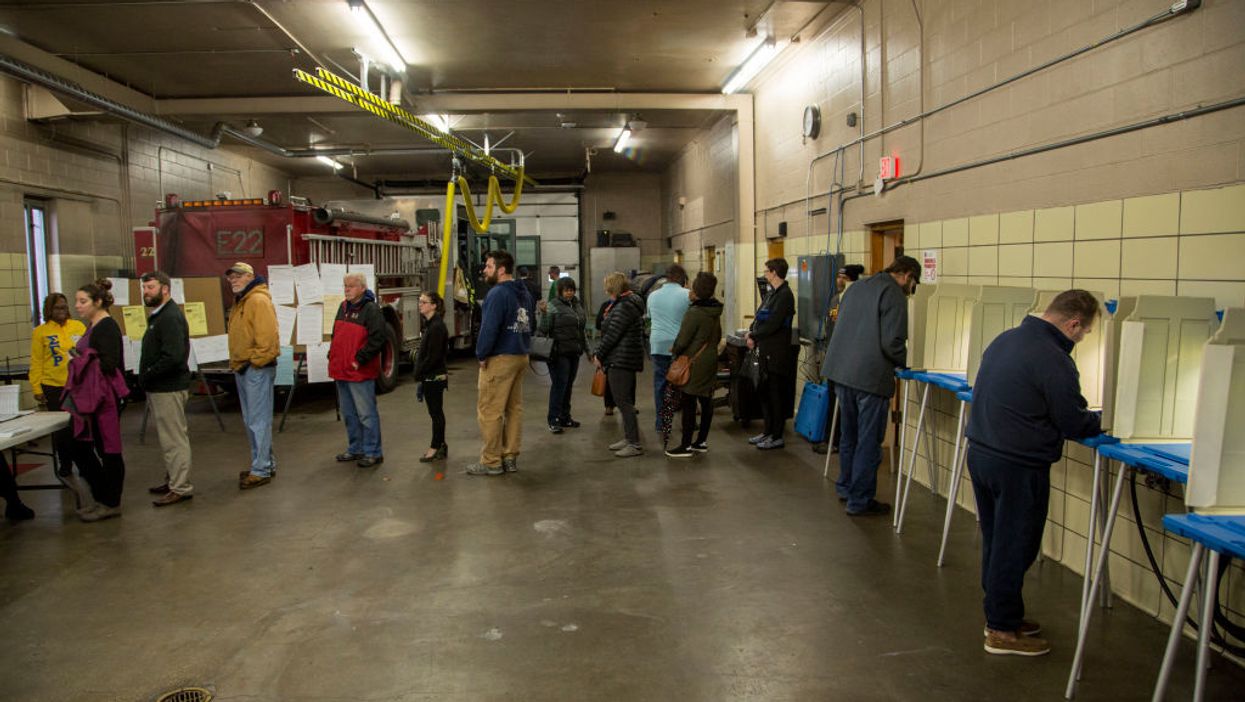UPDATE: Democratic Gov. Tony Evers reversed his longstanding position on Friday afternoon and said Wisconsin's primary set for Tuesday should be delayed. He called a Saturday special session of the Legislature, run by Republicans, to debate a bill creating an all-mail election with a May 26 deadline. The headline above is new, the story below is not.
Wisconsin's primary is on course for Tuesday after a federal judge ripped the state's leaders for not postponing the election in the middle of the coronavirus pandemic but said he did not have the authority to delay it.
Every other state that scheduled an April contest has postponed or transformed it to almost all vote-by-mail. But Democratic Gov. Tony Evers and the Republican-led Legislature agreed on no delay and only relatively minor changes — leaving voting rights groups and campaigns predicting confusion, anger and maybe a wave of illness next week.
U.S. District Judge William Conley on Thursday did extend until Friday evening the deadline for applying for absentee ballots, which more than 1.1 million Wisconsinites have already done. He also ordered ballots received as long as six days after election day to get counted and waived a requirement that a witness sign every absentee ballot, which would mean hundreds of thousands of social distancing violations.
The legal battle is not quite over, however. The national and state Republican parties have already appealed Conley's easements of those rules to the 7th Circuit Court of Appeals. And state lawmakers have asked that court to let them get involved at the last minute.
Whether or not Conley's changes stand, the election seems sure to be chaotic. It is not clear how many will actually venture out to the polls, and those who do may find their normal polling sites shuttered because too many poll workers did not show up.
Most of them are elderly, the group most vulnerable to Covid-19, and already about 60 percent of municipalities say they know they will not have enough poll workers. As many as 7,000 are expected to stay away. Evers says the National Guard will fill in at some locations.
Milwaukee officials say they are planning to open fewer than a dozen polling places instead of the usual 180. (The state's largest city is hosting the Democratic presidential convention, which this week was delayed by five weeks and will now begin Aug. 17.)
State officials said they were compelled to press ahead with the primary because, in addition to the 84 Democratic presidential delegates at stake, nonpartisan races are on the ballot for local offices and judgeships — including a potentially pivotal state Supreme Court seat — that will become vacant within weeks without a winner.
The marquee contest seems to be a foregone conclusion, because former Vice President Joe Biden is running about 30 points ahead of Sen. Bernie Sanders in recent polls. So the election may end up being far more significant in establishing legal boundaries for what changes are allowed during a health emergency and who can make them.
In addition, high levels of pandemonium and outrage, with many Wisconsinites feeling disenfranchised and endangered, could change the dynamic for the fall, when the state will be a premier presidential battleground.
Conley wrote that the governor is trying to "thread the needle" by garnering a large enough turnout so the election will be considered legitimate while at the same time not causing a greater outbreak of the coronavirus.
"However unlikely this outcome may be, or ill-advised in terms of the public health risks and the likelihood of a successful election, the only role of a federal district court is to take steps that help avoid the impingement on citizens' rights to exercise their voting," the judge wrote.
The court's ruling came in a case that was the consolidation of three different lawsuits: one by minority voting rights advocates, another by the state and national Democratic parties, and the last by advocates for elderly voters who live alone. The last group pressed the argument that getting a witness signature on a ballot posed an unacceptable health risk.
Others argued that so many people were switching to mail-in ballots that the deadlines involved had to be extended. The judge moved the deadline for requesting the form by one day, to 5 p.m. Friday, and extended by six days, to 4 p.m., April 13, the deadline for absentee ballots to arrive at election offices.
He set no requirement for when those ballots had to be postmarked, prompting Republicans to say the judge has effectively (and wrongly) delayed the primary date.
"In the absence of the legislature doing its part to ensure a fair and safe election, I appreciate that the court chose to implement some common-sense solutions that I've been advocating for," Evers tweeted.
Evers a week ago asked the Legislature to pass emergency legislation sending ballots to every registered voter, but the GOP leaders quickly rebuffed him.
"Unless this is appealed," Chairman Dean Knudson of the state Elections Commission said after the judge's ruling, "we're going to have area mess."




















Trump & Hegseth gave Mark Kelly a huge 2028 gift